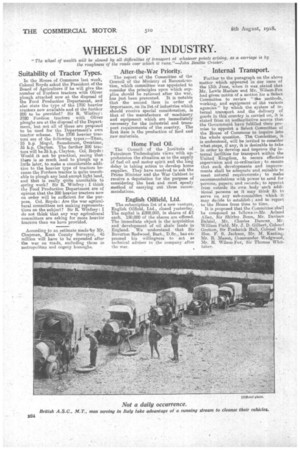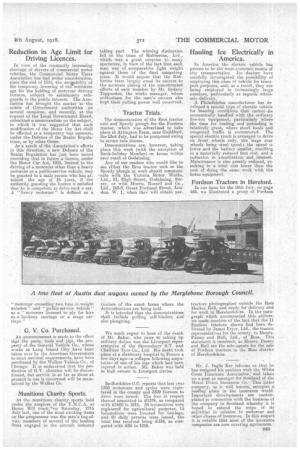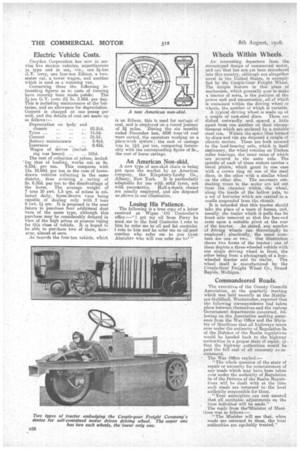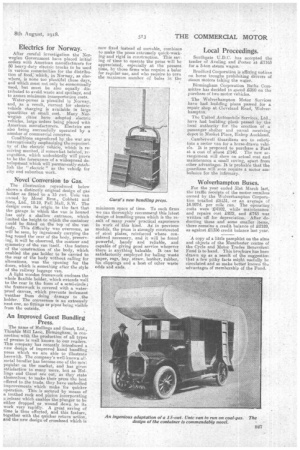WHEELS OF INDUSTRY.
Page 4

Page 5

Page 6

Page 7

If you've noticed an error in this article please click here to report it so we can fix it.
The wheel of wealth will be slowed by all diDieulties of transport at whatever points arising, as a carriage is by the roughness of the roads over which it runs."—John. Beattie Crozier.
Suitability of Tractor Types.
In the House of Commons last week, Colonel Royds asked the President of the Board of Agriculture if he will give the number of Fordson tractors with Oliver plough attached now at the disposal of the Food Production Department, and also state the type of the 1700 heavier tractors now available and of the further 200 to be provided? Sir R. Winfrey : 3700 Fordson tractors with Oliver ploughs are at the disposal of the Department, but not all of these are proposed to be used for the Department's own tractor scheme. The 1700 heavier tractors are of the following types :—Titan, 25 h.p. Mogul, Saunderson, Overtime, 35 h.p. Clayton. The further 200 tractors will be 35 h.p. Clayton. Col. Royds Would it not be practical, seeing that • there is so much land to plough up a little later; to make a considerable addition to the heavier type of tractors because the Fordson tractor is quite unsuitable to plough any land except light land, and that is really quite unsuitable to spring work? Sir R. Winfrey : I think the Food Production Department are of opinion that the 200 heavier tractors now on order will be sufficient for the purpose. Col. Royds Are the war agricultural committees not making representations on the subject? Sir R. Winfrey : I do not think that any way agricultural committees are asking for more heavier tractors than we have provided.
According to an estimate made by Mr. Chapman, Kent County Surveyor, 45 million will have to be expended after the war on roads, excluding :those in metropolitan and county boroughs.
After-the-War Priority.
The report of the Committee of the Council of the Ministry of Reconstruction, which committee was appointed to consider the principles upon which supplies should be rationed after the war, has just been presented. It is notable that the second item in order of importance, on its list of industries which should receive special consideration, is that of the manufacture of machinery and equipment which are immediately necessary for the industrial and transport requirements of the country. The first item is the production of food and raw materials.
Home Fuel Oil.
The Council of the Institute of Petroleum Technologists views with ap7 prehension the situation as to the sapply of fuel oil and motor spirit and the long delay in taking action to develop home supplies. They have resolved to ask the Prime Minister and the War Cabinet to receive a deputation for the purpose of considering the best and most speedy method of carrying out these recommendations.
English Oilfield, Ltd.
The subscription list of a new venture, English Oilfield, Ltd., closed yesterday. The capital is £300,000, in shares of £1 each. 150,000 of the shares are offered. The immediate object is the acquisition and development of oil shale lands in England. We understand that Sir Boverton Redwood, Bart., D.Sc., has expressed his willingness to act as technical adviser to the company after the war.
Internal Transport.
Further to the paragraph on the above matter which appeared in Our issue of the 13th June, when it wasestated that Mr. Lewis Haslam and Mr. _Wilson-Fox had given notice of a motion for a Select Committee to review "eke methods, working, and equipment of the various agencies" by which the system of in, ternal transport and the delivery of goods in this country is carried on, it is stated from an authoritative 'source that the Government have fulfilled their promise to appoint a Select Committee of the House of Commons to inquire into the whole question. The Committee, it is understood, will be invited to consider what steps, if any, it is desirable to take in order to develop and improve the internal facilities for transport within the United Kingdom, to secure effective supervision and co-ordination; to ensure that such developments and improvements shall be adequate and suitable to meet natural requirements; to make recommendations with power to send for persons, papers, and records; to appoint from outside its own body such additional persons as it may think fit to serve on any sub-committee which it may decide to establish ; and to report to the House from time to time.
It is proposed that the Committee shall
be composed as follows Acland Allen, Sir Shirley. Bean, Mr. Davison • Dalziel, Mr. Charles Duncan, Mr. William Field, Mr. J. D. Gilbert, Colonel Gretton, Sir Frederick Hall, Colonel the Hon. F. S. Jackson, Mr. M. Keating, Mr. R. Mason, Commander Wedgwood, Mr. H. Wilson-Fox, -Sir Thomas Whittaker.
Reduction in Age Limit for Driving Licences.
In view of the constantly increasing shortage of drivers of commercial motor Vehicles, the Commercial Motor Users Association has had under consideration, since the end of 1916, the delability of the temporary lowering of the minimum age for the holding of motorcar driving licences, subject to satisfactory safeguar& in the public interest. The Association has brought the anatter to the notice of Government authorities on several occasions, and recently, at the request of the Local Government Board, submitted a mernorancluin on the subject, in which it was suggested that such modification of the Motor Car Act shall be effected as a temporary war measure, under the Defence of the Realm Regulations, or by other Order. Aff a result•ef the Association's efforts in this direction, a new Defence of the Realm Regulation has just been issited providing that in future a licence, under the Motor Car Act, 1903, limited to the driving of a motorcar other than a heavy motorcar or a public-service vehicle, may be granted to a male person who has attamed the age of 16 years, if the authority granting the licence is satisfied that he is competent to drive suck a car. " heavy motorcar" is defined as a " motorcar exceeding two tons in weight unladen" and •" public-service vehicle ", as a " motorcar licensed to ply for hire . as a hackney carriage or a stage carriage."
G. V. Co. Purchased.
An announcement is made to the effect that the parts, tools and jigs, the property of the General Vehicle Co., whose works at Long Island City have been taken over by the American Government to meet national requirements, have been purchased by the Walker Vehicle Co., of Chicago. It is understood that the production of G.V. electries will be discontinued, but service in so far as those at present in use is concerned will be maintained by the Walker Co.
Munitions Charity Sports.
At the munitions charity sports held under the auspices of the Y.M.C.A. at Herne Hill track,l'on Saturday, 27th July last, one of the most exciting items on the programme was the men's tug-ofwar, members of several of the leading firms engaged in the aircraft industry taking part. The winning distinction fell to the team of Rubberine, Ltd., which was a great surprise to many' spectators, in view of the fact that each man was of comparative light weight against those of the final competing team. It would appear that the Rubberine team largely owed its success to the accurate timing of the concentrated efforts of each member by Mr.. Sydney Tappenden, the wOrits manager, whose enthusiasm for the men's success also Inept their pulling power well conserved.
• Tractor Trials.'
: The demonstration of the Eros tractor unit and Speedy plough for the Fordson tractor, which was advertised to take place at Artington Farm, near Guildford, the 23rd July, had to be postponed owing to severe rain storms. Demonstrations are, however, taking place this week (with the exception of Bank-holiday Monday) on farms within easy reach of Godalming. Any of our readers who would like to see either the Eros tractor unit or the Speedy plough at work should communicate with the Victoria Motor Works, Ltd., 21, High • Street, Godalming, Surrey, or with Morris, Russell and Co,, Ltd., 163-5, Great Portland Street, London. W. 1. when they will obtain par Oculars of the exact farms where the demonstrations are being held. It is intended that the demonstrations shall –include pulling self-binders and also ploughing.
We much regret to hear of the death of Mr. Baker, who prior to. taking up Military duties was the Liverpool repreSentative of the Shrewsbury S.T. and ChaIliner Tyre Co., Ltd. His death took place at a stationary hospital in France a few days ago—a collapse following amputation of one of his legs which had been injured in action. Mr. Baker was held in high eateem in Liverpool circles.
Bedfordshire C.C. reports that last year 1368 motorcars and cycles were registered in the county and 3399 licence,s to drive were issued. The fees in respect thereof amounted to £1376, as compared -with £1650 in 1916. 35 locomotives were registered for agricultural purposes, 13 locomotives were licensed for haulage, and 80 daily permits were issued, the total fees received being £134, as compared with 95 in 1916.
Hauling Ice Electrically in America.
In America the electric vehicle has proven to he the most economic means of city transportation. Ice dealers have carefully investigated the possibility of employing this class of vehicle for transport purposes, and, as a result, they are being employed in increasingly barge numbers, particularly as regards wholesale delivery.' A Philadelphia manufacturer has de veloped a special type of electric vehicle for -strieeting conditions that cannot he economically handled with the ordinary five-ton equipment, particularly where the time for loading and nnloading is relatively great, where short hauls and congested traffic is encountered. The special electric truck is arranged to drive on front wheels only, the large rear wheels being steel tyred ; the speed is lower and the battery smaller, resulting in a materially reduced first cost, and a reduction in amortization and. interest. Maintenance is also greatly reduced, resulting in a total cost lower than the cost of doing the same work with the horse equipment.
Fordson Tractors in Hereford. In our issue for the 18th July, on page 444. we illustrated a group of Fordson.
tractors photographed outside the Ross Market Hall, and ready for delivery and for work in Herefordshire. In the paragraph which accompanied this pieture, we made mention of tire fact that the 11 Fordson tractors shown had. been 'delivered by James Fryer, Ltd., the tractor representatives for the county, to Messrs. Passey and Hall, Ltd., of AOS.S. This statement is incorrect, as Messrs. Passey and Hall are the soleagents for the sale of Fordson tractors in the Ross district of Herefordshire, Mr. J. Inglis Ker informs us that he has resigned his position with the White Cross Insurance: Association; and taken up a post as manager for Scotland of the Motor Union Insaranee Co.. This latter company, as is well known, occupies' a
i
leading place n the insurance world. Important developments are contemplated in connection with the business of the company in Scotland Whereby it is hoped to extend the scope of its activities in relation to motorcar and other classes of insurance. In this respect it is notable that most of the insurance companies are now covering agrimotors.
Electric 'Vehicle Costs.
Croydon Corporation has now in service five electric vehicles, miscellaneous in type and in use, viz., one *ton G.V. lorry, one four-ton Edison, a twoseater car, a tower wagon, and. another which is used as a watering van.
Concerning these the following interesting figures as to costs Of running have recently been made public. The 421-ten G.V. costs £1 5s. .3.58d. per day. This is including maintenance of the batteries, and an allowance for depreciation. Current is charged at one penny per unit, and the details of cost are made up as follows:—
Depreciation on body and chassis ... ... 62,51.d.
Tyres L.. 14.3d. Current
• Battery maintenance ... 9.41d.
Insurance ... 8,43d. Wages of driver (includ • ing war bonus) ... 105d.
The cost of collection of refuse, includ'ing that of loading, works out at 9s. 4.33d. -per ton. This compares with 11s. 10.68d. per ton in the case of horsedrawn vehicles Collecting in the same district, thus evincing a saving of 2e. 6,35d. per ton to the disadvantage of the horse. The average weight of 7 tons 10 cwt. 1.5 qrs. of refuse is colleeted daily, horse-drawn vans being capable of dealing only with 2 tons 9 cwt 1 qrs. It is proposed in the near future to purchase four additional dust vans of the same type, although this purchase may be considerably delayed in view of the high prices at present ruling for this class of vehicle. It is hoped to he able to purchase two of them, however, almost at once.
As regards the four-ton vehicle. which
is an Edison, this is used for cartage of coal, and is employed on a round journey of n miles. During the six months ended December last, 4590 tons 'of coal were carted, the operators working on a piece-work system ; the cost of cartage was la. lid. per ton, comparing favourably with the corresponding figure of 2s., the cost of horse cartage.
An American Non-skid.
A new type of non-skid chain is being put upon the market by an American company, the King-shitry-Leahy Co., Albany, New York. It is particularly adaptable for use with sdlid tyres, net
with pneumatics. Half-a-dozen chains are usually employed, and are disposed as shown in our illustration.
Losing His Patience.
The following is a true copy of, a letter received at Wigan -Oil Controller's office —'i get my oil from Perry he send me to the food Controler i rote to him he refer me to oil and fat controler i rote to him and he refer me to oil-seed comitee who refer nye to you Crist Almighty who will you refer me
Wheels Within Wheels. .
An interesting departure from the stereotyped design of commercial motor, and one that has not yet been introduced into this country, although uot altogether novel in the 'United States, is exemplified by the Couple-Gear Freight Wheel. The unique feature in this piece of mechanism, which generally goes to make a tractor of sorts, is the position of the power unit and transmission, all of which is contained within the driving wheel or wheels, the number of which is variable.
A typical driving wheel is made up of a couple of cast-steel discs. These are dished outwardly and spaced a little apart from one another on their "circumferences which are enclosed by a suitable steel rim. Within the space thus formed by-discs and rim are disposed a Couple of electric motors. These are both securedto the load-bearing axle, which is itself stationary, the wheel running on Timken roller bearings, the inner races of which are secured to the same axle. The spindle of each of these motors carries-a bevel pinion, which gears. in one case with a crown ring on one of the steel discs, in the other with a similar wheel on the other disc. The necessary conducting wires to the motor are led out from the chamber within the wheel, along the inside of the hollow axle, to a set of batteries which are carried. in a cradle suspended from the chassis.
It is intended that this tractor should take the place of a team of horses, and, usually, the trailer which it puns bas its front axle removed so that the fore-end rests upona suitable pivot at the rear of the tractor. As stated, any number of driving 7heels can theoretically be employed; practically, the usual num bers are one or two. Our illustration shows two forms of the tractor: one of them depicts a three-wheeled vehicle with one single driving wheel in front, ti-is other being froma photograph of a fourwheeled tractor and its trailer. The wheel itself is manufactured by the Couple-Gear Freight Wheel Co., Grand Rapids, Michigan.
Commandeered Roads.
The executive. of the County Councils Association, at the quarterly meeting which was held recently at the Middlesex Guildhall, Westminster, reported that the following correspondence had taken place between themselves and the various • Government departments concerned, fob lowing on the Association seeking assurance from the War Office and the Minis'try of Munitions that all highways taken over under the authority of Regulation 5a of the Defence of the Realm regulations would be handed back to the highway authorities in a proper state of repair, elthat the highway authorities would be . paid the full cost of all necessary re-in. statement.
The War Office replied:— " The whole question of the state of repair or necessity for reinstatement of any roads which may have been taken over under the authority of Regulation 5a of the Defence of the Realm Regulations will be dealt with at the time such roads are returned to the local authority responsible for them. "Your association can rest assured that all equitable adjustments on the lines indicated will he made."
The :reply from theuMinister of Munitions was as follows:— " The Minister will see that, when roads are returned to them, the local authorities are equitably treated."
Electrics for Norway.
After careful investigation the Norwegian Government have placed initial orders with American manufacturers for 50 heavy-duty electric trucks to be used in various ,communities for the distribution of food; which, in Norway, as elsewhere, is none too plentiful these days, and which mast not only be economically used, but must be also equally distributed to avoid waste and Spoilage, and to assure minimum transportation costs. Water-power is plentiful in Norway, and, as a result, current for electricvehicle charging is available in large quantities at .small cost. Many Norwegian cities have adopted electric vehicles, large orders being placed with American manufacturers. Electrics are also being successfully operated by a number of commercial concerns.
Conditigns engendered by the war are internationally emphasizing the auperiority of the electric vehicle, which is receiving Merited, if somewhat belated; recognition, which undoubtedly will prove to be the forerunner of a widespread development which will permanenthaestablish the " electric " as the vehicle for city and suburban work.
Novel Conversion to Gas.
The illustration reproduced below shows a distinctly original design of gas holder as fitted to a 15 cwt. Unic van owned • by Morel Bros., Cobbett and Sons, Ltd., 18-19, Pall Mall, S.W. The design owes. its origin to the fact that the garage in which the van is housed has only a shallow entrance, which limited the height to which the container could be fitted on the top of the van body. This difficulty was overcome, as will be seen, by ingeniously carrying the bag round the rear of the body, preserving, it will be observed, the contour and symmetry of the van itself. One feature of the construction of the body, which enabled the gas holder to be carried to the rear of the body without calling for alterations, was the opening' for the doora, which is something after the style of the railway luggage van.
A light wooden framework encloses the whole flexible holder, which extends well to the rear in the form of a semi-circle; the framework is covered with a waterproof canvas, which prevents inclement weather from doing damage to the holder. The conversion is an extremely neat one, no fittings or pipes being visible from the outside.
An Improved Guest Bundling Press.
The name of Hollings and Guest, Ltd., Thimble Mill Lane, Birmingham; in connection with the production of all types of presses .is well known to our readers. This company has recently introduced a new design of improved hand bundling press which we are able to illustrate herewith. The company's well-known altmetal bundler has become one of the most popular. on the market, and has given satisfaction to many users, but as 'Hollings and Guest are out, as they state themselves, to Snake their press the best offered to the trade, they have embodied improvements which make for quicker operation. This is secured by means of a toothed .raele and .pinion incorporating a release which enables the plunger to be either dropped or wound .down. to its work very rapidly. A great saving of time is thus effected, and this .feature, together with the quicker return action, and the new design of crosshead which is
now fixed instead of movable, combines to make the press extremely quick-working and rigid in construction. This saving of time to operate the press will be appreciated, especially at the present time, by those firms who require a baler for regular use, and who require to turn the maximum number of bales in the
minimum space of time. To such firms we can thoroughly recommend this latest design of bundling-preas which is the result of many years' practical experience in work of this kind. AS' in previous models, the press is strongly constructed of steel plates, reinforced where considered necessary, and it will be found powerful, handy and reliable, and capable of giving good service wherever there is anything balea,ble. It can be satisfactorily employed for baling waste paper, rags, hay., straw, leather, rubber, tin clippings and a host of other waste odds and ends_
Local Proceedings.
Southgate U.D.C. has accepted the tender of Aveling and Porter at £1163 for a 5-ton steam wagon.
Bradford Corporation is affixing notices on horse troughs prohibiting 'drivers of steam motors taking the water.
Birmingham Corporation Baths Committee has decided to spend £350 on the purchase of two motor vehicles. • The Wolverhampton Motor Services have had building Plans passed for a, repair shop at Cleveland Road, Wolverhampton, The United Automobile Services, Ltd., have had building plans passed by the local authority for the 'erection of a passenger shelter and parcel receivin„a depot in Market Place, Bishop Auckland.
Camberwell Guardians are to aubstitutu a motor van for a horse-drawn vehicle. It is proposed to purchase a Ford at a cost of about £140. The new arrangement will show • on actual cast and maintenance a small saving, apart. from other advantages. It is probable that the guardians will soon require a motor ambulance for the infirmary.
Wolverhampton Buses.
For the year ended 31st March last, the traffic receipts of the Mater omnibus owned by OS Wolverhampton Corpora • Mon totalled £8131, or an average of 14.997d. per mile run. The operating • costs were £4102, while' maintenance and repairs cost £822, and £743 was written off for depreciation. After deducting these and some smaller items,. there remains a credit balance of £2189, as against £1356 credit balance last year.
A copy of a little pamphlet on the aims and objects of the Manchester centre of the Cycle and Motor Trades Benevolent Fund is to hand. This brochure has been • -drawn up as a result of -the suggestion that a few pithy facts might usefully be circulated and so make better known the advantages of membership of the Fund. .






















